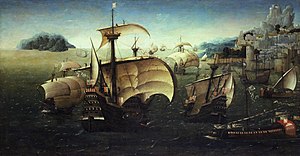| War of the League of the Indies | |||||||
|---|---|---|---|---|---|---|---|
 16th century Portuguese carracks (naus) and galleys | |||||||
| |||||||
| Belligerents | |||||||
|
|
Co-belligerents: | ||||||
| Commanders and leaders | |||||||
|
|
| ||||||
| Strength | |||||||
|
[1] |
Kingdom of Garsopa
| ||||||
| Casualties and losses | |||||||
| Unknown | Over 25,000 | ||||||
The War of the League of the Indies (December 1570–1575) was a military conflict in which a pan-Asian alliance formed primarily by the Sultanate of Bijapur, the Sultanate of Ahmadnagar, the Kingdom of Calicut, and the Sultanate of Aceh, referred to by the Portuguese historian António Pinto Pereira as the "league of kings of India", "the confederated kings", or simply "the league", attempted to overturn Portuguese presence in the Indian Ocean. This was attempted through a combined assault on some of the main possessions of the Portuguese State of India: Malacca, Chaul, Chale fort, and the capital of the maritime empire in Asia, Goa.
The Portuguese successfully resisted all sieges against the "league", with the exception of a small fort in the outskirts of Calicut that fell to the Zamorin, the ruler of Calicut. It would be the first time the Portuguese formally capitulated in India.[2]
It was a total war, as the Portuguese were forced to mobilize every available means to resist the assault.[3]
- ^ Monteiro 2011, p. 328.
- ^ Monteiro 2011, p. 362.
- ^ Feio 2013, p. 135.
© MMXXIII Rich X Search. We shall prevail. All rights reserved. Rich X Search
